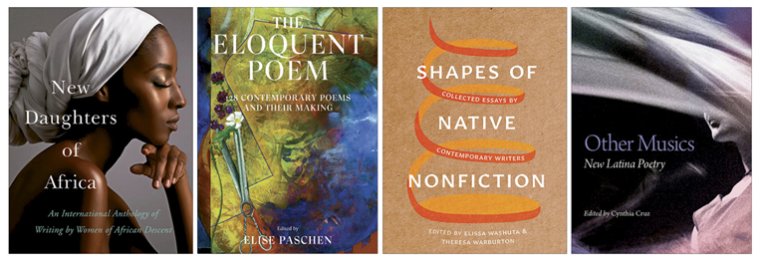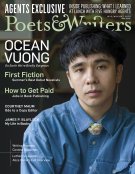Among the many new books published every month is a shelf full of notable anthologies, each one showcasing the work of writers united by genre, form, or theme. The Anthologist highlights a few recently released collections, including Shapes of Native Nonfiction: Collected Essays by Contemporary Writers edited by Elissa Washuta and Theresa Warburton.

In 1992 editor Margaret Busby compiled Daughters of Africa, a landmark anthology of writing by women of African descent. Twenty-seven years later, Busby has put together a follow-up anthology, New Daughters of Africa: An International Anthology of Writing by Women of African Descent (Amistad, May 2019). One thousand pages long, the collection features more than two hundred poets and prose writers from the nineteenth century to present day, including Edwidge Danticat, Nawal El Saadawi, and Margo Jefferson.
![]()
In The Eloquent Poem: 128 Contemporary Poems and Their Making (Persea Books, May 2019), more than a hundred poets share previously unpublished poems along with micro-essays about the genesis of those poems. Edited by poet Elise Paschen, the collection is organized into different poetic approaches such as persona poems, eclogues, and ekphrastic poems. The book opens with an ars poetica by Joy Harjo and ends with a collage poem by Kevin Prufer.
![]()
Deborah Miranda, Terese Marie Mailhot, and many more have contributed essays to Shapes of Native Nonfiction: Collected Essays by Contemporary Writers (University of Washington Press, June 2019). Drawing on the craft of basket weaving, editors Elissa Washuta and Theresa Warburton have organized the essays around four terms—technique, coiling, plaiting, and twining—to “establish the unique, pivotal work that Native authors are doing to explore the boundaries of form.”
![]()
“What we have here is a new kind of music,” writes editor Cynthia Cruz in the introduction to Other Musics: New Latina Poetry (University of Oklahoma Press, April 2019). “A new generation of Latina/x poets is making beautiful, smart, and interesting poetry, incorporating not just the Latino/a tradition but also incorporating postmodernism, post-postmodernism and new attempts at lyricism.” Contributors include Xochiquetzal Candelaria and Ada Limón.








